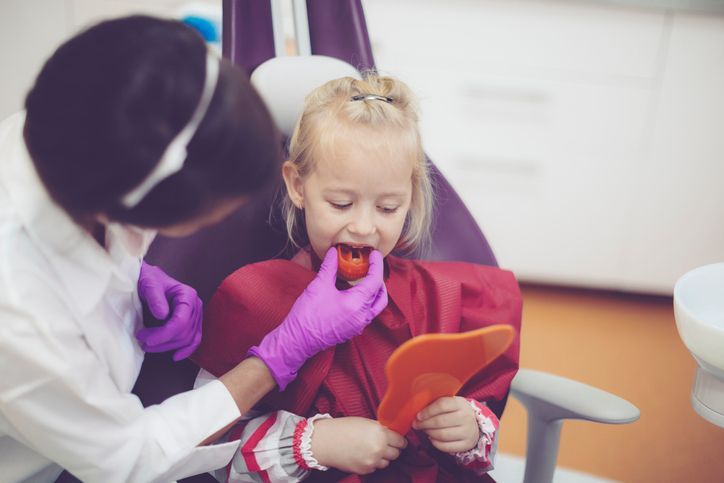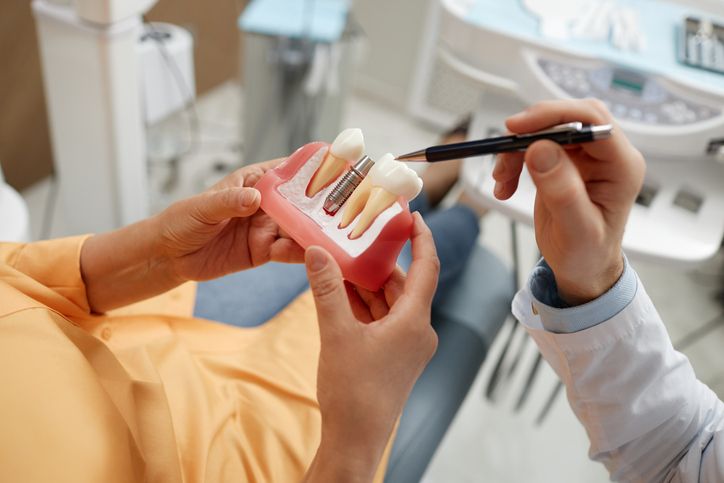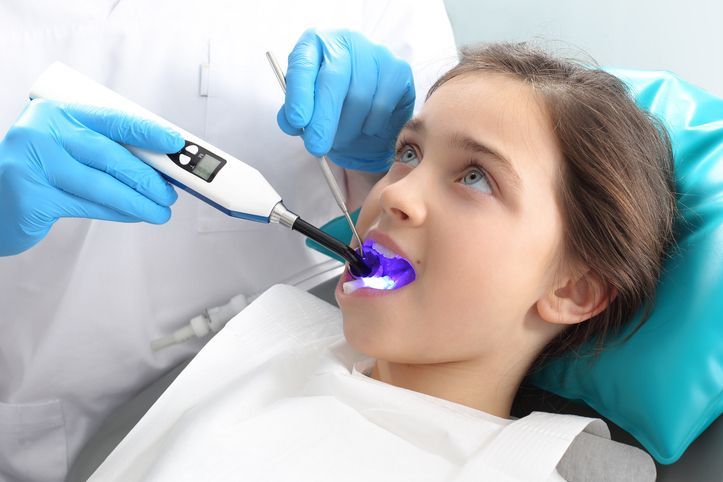A Guide to Living with Invisalign
If you are beginning your journey to a straighter, healthier smile with Invisalign, there are some things you need to know to ensure you have the best experience. At Severns Dentistry & Orthodontics, we have created a guide to help you live your best life with Invisalign!
Our Invisalign Guide Includes:
Common Invisalign Myths
There is a variety surrounding Invisalign, so to ensure you know the facts, we have put together some of the most common Invisalign myths.
Invisalign is slower or faster than other orthodontic treatments.
Some people assume that traditional or lingual braces on the front teeth will work faster to improve your smile, but it is not true. When you use Invisalign, you wear the aligners for 22 hours a day, and you will wear each set of aligners for 14 days. Every set of aligners works to slowly reposition your teeth into the correct position. Many patient reports claim that those with mild to moderate malocclusion see results within six months of treatment with Invisalign.
Typically, Invisalign treatment lasts about 12 to 18 months, much like traditional braces.
Invisalign is not as effective as traditional metal braces.
Traditional braces have been a popular orthodontic treatment method for years. With advancements in orthodontic treatment technology, we now have treatments like Invisalign that are designed with the same concept as traditional braces, but they are clear aligners rather than metal with brackets and wires. Invisalign aligners work the same as traditional braces do by slowing moving your teeth into the ideal position.
Traditional braces and Invisalign can both be used to correct issues such as crossbites, overbites, underbites, as well as gaps between your jaws.
Invisalign treatment is not covered by insurance.
This is false. Many dental insurance companies do cover some of the cost of Invisalign treatment. It is best to speak with your insurance provider prior to getting Invisalign to see how much of your treatment cost will be covered.
Invisalign is not suitable for children.
It is a common myth that Invisalign is not suitable for children. The truth is, if the child has reached proper teeth growth and jaw development, they are likely a candidate for Invisalign. This treatment is not suitable if the child’s teeth are still growing and developing.
When using Invisalign, you do not have to pay as much attention to oral hygiene.
The Invisalign clear aligners are removable for eating, helping to reduce the build-up of food particles, but they still need to be cleaned with a soft-bristled brush to remove plaque build-up. Since they are removable, you can brush and floss normally, so tending to your oral hygiene easier than with traditional braces. You should also rinse your mouth or brush your teeth after eating or drinking before placing your aligners back in. Oral hygiene is a critical part of Invisalign treatment and should be a focus during and after your treatment.
Everyday Invisalign Maintenance
Since you are wearing your aligners for 22 hours a day, it is important to maintain them properly to ensure they remain clean and comfortable to wear. There are several things you can do to take good care of aligners throughout your treatment, including:
Rinse your aligners after removing them.
By rinsing your aligners after removing them, you help to remove the excess saliva and plaque present on the aligners before your store them in their case. You should also rinse them throughout the day to prevent the build-up of bacteria.
Soak your aligners daily.
By soaking your aligners every day, you can remove stains, odors, and bacteria that have accumulated on your aligners. This will keep them clear and clean for you to use. To soak your aligners, place the Invisalign cleaning crystals or other Invisalign-safe cleaners into a cup of lukewarm water. Allow the aligners to soak for 15 minutes, and then brush off your aligners with a soft-bristle toothbrush.

Make cleaning your aligners regularly a habit.
Cleaning your aligner trays often is the best way to care for them. Start a routine where you clean the aligners in the morning and in the evening when you are brushing your teeth.
Avoid eating with your aligners in.
Since your aligners are removable, you don’t have to leave them in a while eating or drinking. Eating or drinking with the aligner trays can lead to staining or damage. You should only drink water while wearing your aligners.
Do not use abrasive materials to clean your plastic aligners.
Avoid scrubbing your aligners with denture cleaner, mouthwash, or soap. The ingredients in these products can be abrasive, which can cause your aligners to look dull and therefore less invisible.
Brush and floss after removing our aligners.
Brushing and flossing before placing your aligners back in is crucial. If you have plaque or food particles stuck in your teeth when you place your aligners back in your mouth, it can lead to issues such as gingivitis or cavities.
Keep your Invisalign case on hand.
You always want to make sure you store your aligners in their case when you are not wearing them. This will keep them clean while also preventing you from losing, damaging, or accidentally throwing away your aligners.
By following these maintenance tips, you can keep your aligners invisible and free of harmful bacteria throughout your treatment!
Food and Drinks to Avoid with Invisalign
With metal braces, you will find that there are a variety of restrictions when it comes to foods you can and can’t eat since certain foods such as popcorn can lead to damage to your braces.
With Invisalign, you can remove them to eat and drink, which lessens the restrictions on what you can eat and drink during your Invisalign treatment. However, there are some foods and drinks we recommend avoiding during your treatment.
Foods to avoid:
When it comes to food, we recommend avoiding spicy foods. Spicy food is acidic and can breakdown teeth and gums, so you should enjoy it sparingly to avoid damage to your teeth and gums.
Icy or cold foods can cause issues with your aligners, and chewing ice can lead to tooth damage. Hard candy and chewing gum can stick to your aligners and ruin them. These candies also leave behind a sugary residue on your teeth that feeds the plaque on your teeth and can cause cavities.

Drinks to avoid:
Dark liquids like wine, tea, or coffee can easily stain your aligners and make them very noticeable. We recommended limiting the consumption of these beverages, not consuming them with your aligners in, and brushing your teeth after drinking them.
Sodas, even those light in color, can leave behind sugar residue on your teeth. Since your aligners fit tightly to your teeth, the acid and sugar in the soda can become trapped between your teeth and aligners, leading to tooth decay. Be sure to limit your intake of soda and brush your teeth after drinking it prior to putting your aligners back in.
It is also important to remove your aligners before drinking hot liquids. Your aligners are sensitive to heat, and melting can occur if you drink hot liquids while wearing your aligners.
You should never eat or drink anything other than water while wearing your aligners. A major perk of Invisalign is that it is discreet and clear. To keep your aligner invisible, it is crucial to remove them before eating or drinking.
Common Questions about Invisalign
What is Invisalign treatment?
Invisalign is a series of clear, removable clear aligners that are used to gradually straighten your teeth. Invisalign has no brackets, no wires, and none of the restrictions that metal braces have.
What are Invisalign aligners made of?
Invisalign aligners are made of a flexible clear plastic that is a patented thermoplastic material called SmartTrack specifically created for Invisalign treatment.
How does Invisalign treatment work?
You will have a consultation with your orthodontist, who will create a digital treatment plan that will map out the exact movements of your teeth during treatment. The aligners are designed to apply pressure to the teeth and gradually move them into the desired position based on your plan. Your orthodontist will monitor your progress and make sure your aligners fit correctly and comfortably.
What are the main benefits of Invisalign?
One major benefit of Invisalign is that they are virtually invisible and will go unnoticed by most people. Another great benefit is that they can be removed for eating and drinking, to brush and floss, and for special occasions and sporting events. You also don’t have to deal with metal brackets or wires that could irritate your mouth or end up breaking.
Am I a Candidate for Invisalign?
Invisalign is a great treatment for both adults and teens who are looking for a discreet and convenient way to straighten their smile. Invisalign can be used to fix almost all common teeth-straightening and bite issues, no matter how simple or complex. The best way to determine your candidacy for this treatment is to have a consultation with your orthodontist.
What is the cost for Invisalign?
Typically, Invisalign is similar in cost to traditional braces. Your orthodontist will determine the cost of your treatment based on the complexity of your case and the number of aligners you will need.
Does my insurance cover Invisalign?
Many dental insurance plans cover Invisalign. Your dental insurance may cover a certain percentage of treatment, or it may cover a specific dollar amount.
How do I care for my aligners?
To care for your aligners, the Invisalign Cleaning System is a great option, or you can brush them with a toothbrush and toothpaste and rinse them with lukewarm water. Avoid using hot water as it can warp the plastic and ruin your aligners.
Be sure to brush your teeth after you eat before putting your aligners back in.
Are there food restrictions with Invisalign?
No, since you can remove your aligner to eat and drink, there are no food restrictions like there would be with metal braces.
Invisalign Treatment in McMurray
At Severns Dentistry & Orthodontics , we specialize in providing expert Invisalign treatment to teens and adults. If you’re ready to begin your journey to a healthy, beautiful smile, contact us today to schedule an appointment!
The post A Guide to Living with Invisalign appeared first on Severns Dentistry and Orthodontics.

Author:
Natalie Severns, DMD
Upon graduating from the University of Pittsburgh School of Dental Medicine, Dr. Severns specialized in Orthodontics and Dentofacial Orthopedics at the University of Pittsburgh School of Dental Medicine. She then did an externship in London, England, at the prestigious Guy’s Hospital. At this hospital, she learned top therapies in Dentofacial Orthopedics to provide her patients with the best possible facial esthetics.
Blog










